September 2023
The Impact of Recovery on a Person’s Life: Lived Experience and Beyond
The Impact of Law Enforcement Programs on Individual Recovery
Reducing Harms Associated With Substance Use Disorder and Co-Occurring Mental Health Issues Through First Responder Deflection
The Story of Veterans Treatment Courts: Judge Robert Russell
Overdose Response Among the White Earth Band of Chippewa Indians
Portraits of Recovery: Doreen Schenkenberger
The Role of Specialized Case Management (SCM) in First Responder Deflection
How Court-based Recovery Support Navigators Benefit Massachusetts Communities
Incorporating Peers in First Responder Deflection
Portraits of Recovery: David Gibbs
The Role of Community Supervision in Supporting Recovery and Reentry
Connecting Harm Reduction Programming, SCM, and Peers Through First Responder Deflection
Recovery Month Related Resources
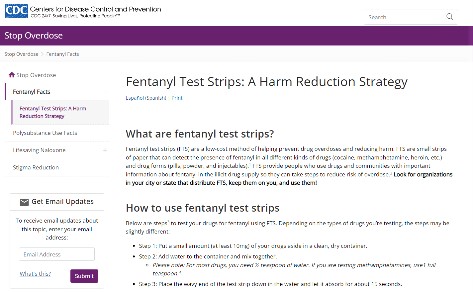 Centers for Disease Control and Prevention, September 2022
Centers for Disease Control and Prevention, September 2022
Fentanyl Test Strips: A Harm Reduction Strategy
Fentanyl test strips (FTS) detect the presence of fentanyl in different kinds of drugs, thereby providing important information that can help reduce risk of overdose. This resource describes the steps taken to test drugs for fentanyl using FTS, as well as other ways to lower risk of overdose.
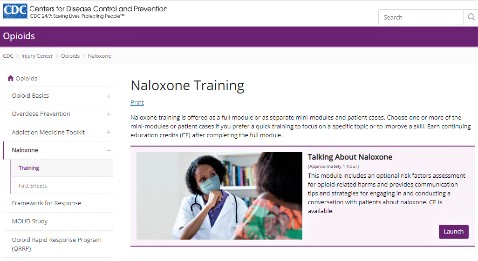 Centers for Disease Control and Prevention, July 2022
Centers for Disease Control and Prevention, July 2022
Naloxone Training
In this resource, naloxone training is offered as a full module or as separate mini-modules and patient cases. Users earn continuing education credits (CEs) after completing the full module.
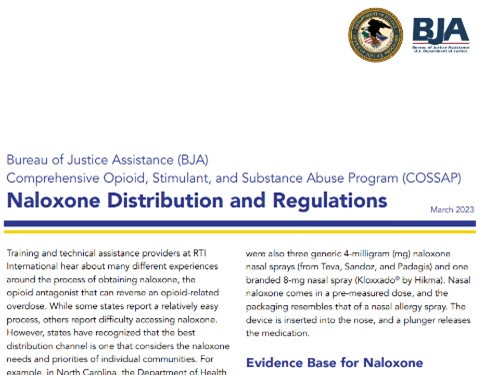 RTI International, March 2023
RTI International, March 2023
Naloxone Distribution and Regulations
States have recognized that the best distribution channel is one that considers the naloxone needs and priorities of individual communities. This brief provides information on current trends and federal regulations as a way to inform the most effective responses.
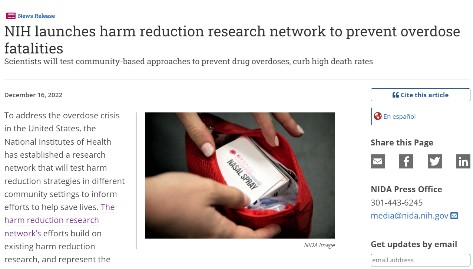 National Institute on Drug Abuse, December 2022
National Institute on Drug Abuse, December 2022
NIH Launches Harm Reduction Research Network to Prevent Overdose Fatalities
The National Institutes of Health (NIH) has established a research network that will test harm reduction strategies in different community settings to inform efforts to help save lives. It represents the largest pool of funding from NIH to date to study harm reduction strategies to address overdose deaths.
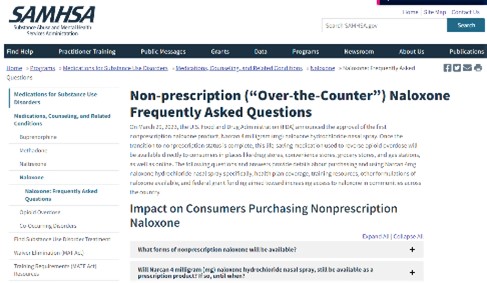 Substance Abuse and Mental Health Services Administration, April 2023
Substance Abuse and Mental Health Services Administration, April 2023
Nonprescription (“Over-the-Counter”) Naloxone Frequently Asked Questions
In March 2023, the U.S. Food and Drug Administration announced the approval of the first nonprescription naloxone product, a naloxone hydrochloride nasal spray. These questions and answers provide details about purchasing and using the nasal spray, health plan coverage, training resources, and federal grant funding increasing access to naloxone.
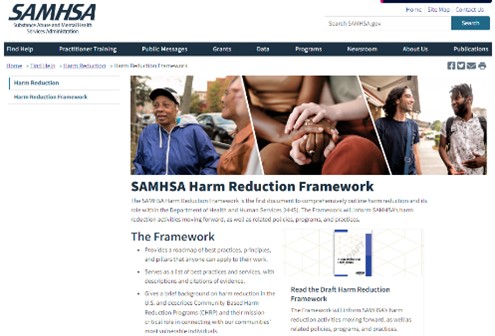 Substance Abuse and Mental Health Services Administration, April 2023
Substance Abuse and Mental Health Services Administration, April 2023
SAMHSA Harm Reduction Framework
The SAMHSA Harm Reduction Framework is the first document to comprehensively outline harm reduction and its role within the Department of Health and Human Services. The Framework will inform SAMHSA’s harm reduction activities moving forward, as well as related policies, programs, and practices.
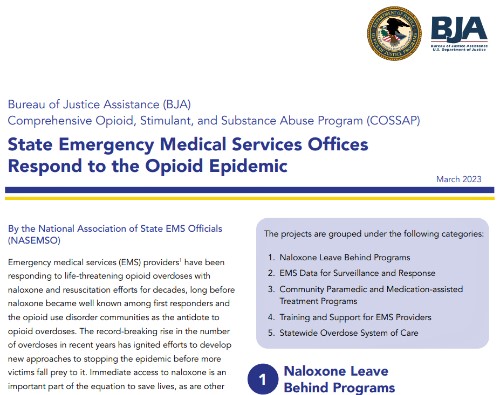 Center for Health and Justice at Treatment Alternatives for Safe Communities, March 2023
Center for Health and Justice at Treatment Alternatives for Safe Communities, March 2023
State Emergency Medical Services Offices Respond to the Opioid Epidemic
This article outlines approaches taken by state emergency medical services (EMS) offices in collaboration with local EMS agencies to address SUD and the opioid epidemic. The examples detailed include naloxone leave-behind programs, data surveillance and response, medication-assisted treatment programs, statewide overdose systems of care, and more.
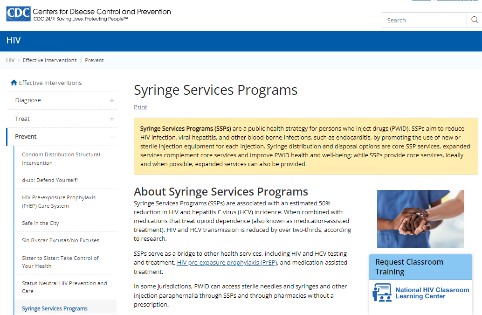 Centers for Disease Control and Prevention, August 2023
Centers for Disease Control and Prevention, August 2023
Syringe Service Programs
Syringe services programs (SSPs) are a public health strategy for persons who inject drugs; they aim to reduce HIV infection, viral hepatitis, and other blood-borne infections by promoting the use of new or sterile injection equipment for each injection. This resource describes SSPs, goals and essential elements of SSP strategies, technical assistance available for SSPs, and additional resources.
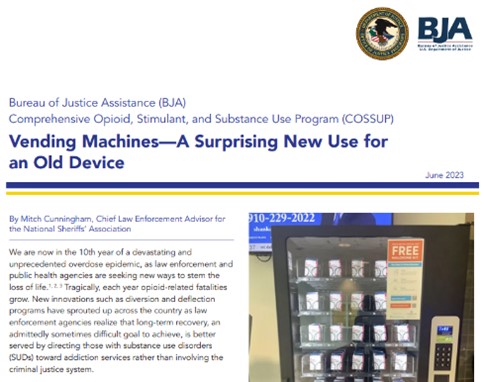 Center for Health and Justice at Treatment Alternatives for Safe Communities, June 2023
Center for Health and Justice at Treatment Alternatives for Safe Communities, June 2023
Vending Machines—A Surprising New Use for an Old Device
Providing access to free naloxone to both those leaving jails and friends and family members visiting jails helps reduce the stigma of having to ask for the resource. This article describes the introduction of vending machines in jails that provide free naloxone, educational materials, and other items.
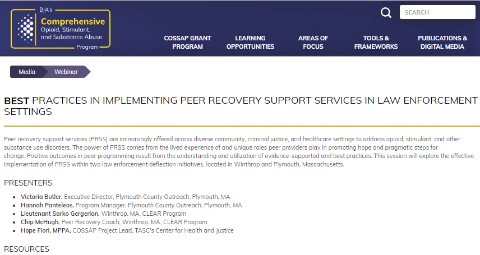 Center for Health and Justice at Treatment Alternatives for Safe Communities, January 2023
Center for Health and Justice at Treatment Alternatives for Safe Communities, January 2023
Best Practices in Implementing Peer Recovery Support Services in Law Enforcement Settings
Peer recovery support services (PRSS) are increasingly offered across diverse community, criminal justice, and health-care settings to address opioid, stimulant, and other substance use disorders. This webinar explores the effective implementation of PRSS within two law enforcement deflection initiatives, located in Winthrop and Plymouth, Massachusetts.
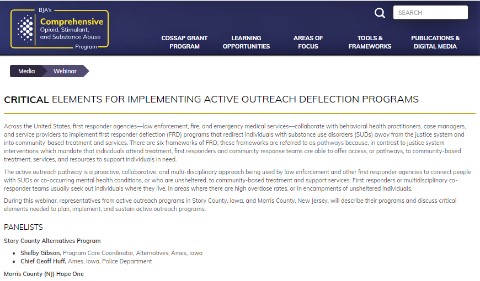 Center for Health and Justice at Treatment Alternatives for Safe Communities, January 2023
Center for Health and Justice at Treatment Alternatives for Safe Communities, January 2023
Critical Elements for Implementing Active Outreach Deflection Programs
The active outreach pathway to deflection is a collaborative approach used by law enforcement and other first responders to connect people with substance use disorders or co-occurring mental health conditions to treatment and support services. In this webinar, representatives from active outreach programs in Story County, Iowa, and Morris County, New Jersey, describe critical elements needed to plan, implement, and sustain active outreach programs.
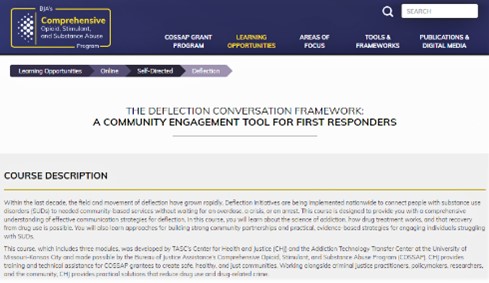 Center for Health and Justice at Treatment Alternatives for Safe Communities, May 2023
Center for Health and Justice at Treatment Alternatives for Safe Communities, May 2023
The Deflection Conversation Framework: A Community Engagement Tool for First Responders
This course is designed to provide users with a comprehensive understanding of effective communication strategies for deflection. It provides detailed information about the science of addiction and how drug treatment works, as well as approaches for building strong community partnerships and practical strategies for engaging individuals with substance use disorders.
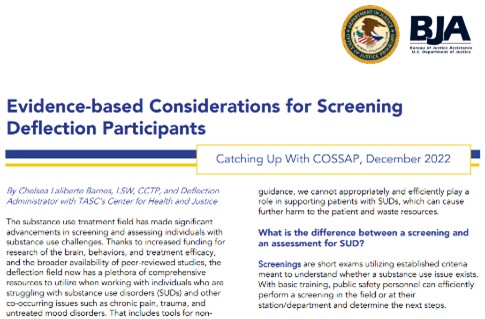 Center for Health and Justice at Treatment Alternatives for Safe Communities, December 2022
Center for Health and Justice at Treatment Alternatives for Safe Communities, December 2022
Evidence-based Considerations for Screening Deflection Participants
The deflection field now has a plethora of resources to utilize when working with individuals who are struggling with substance use disorders and other co-occurring issues such as chronic pain, trauma, and untreated mood disorders. This article offers a close look at the spectrum of screening and assessments, why they exist, and how teams can utilize these tools while engaging with participants.
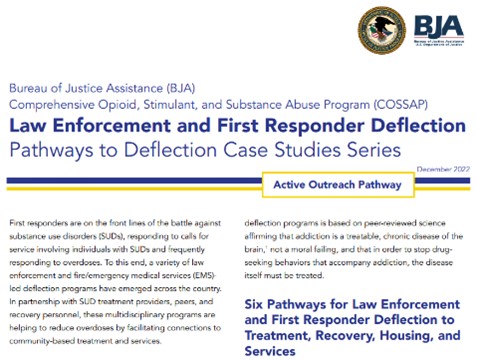 Center for Health and Justice at Treatment Alternatives for Safe Communities, December 2022
Center for Health and Justice at Treatment Alternatives for Safe Communities, December 2022
Law Enforcement and First Responder Deflection Pathways to Deflection Case Studies Series: Active Outreach Pathway
First responders are on the front lines of the battle against substance use disorders (SUDs). In response, law enforcement and fire/emergency medical services-led deflection programs have emerged that redirect individuals with SUDs and co-occurring disorders away from jails or emergency departments and, instead, connect them to treatment. There are six frameworks or “pathways” of first responder deflection; this brief focuses on the Active Outreach Pathway.
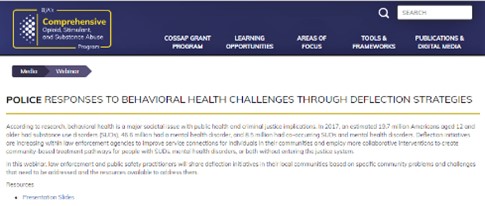 Center for Health and Justice at Treatment Alternatives for Safe Communities, July 2023
Center for Health and Justice at Treatment Alternatives for Safe Communities, July 2023
Police Responses to Behavioral Health Challenges Through Deflection Strategies
Deflection initiatives are used increasingly by law enforcement agencies to create community-based treatment pathways for people with substance use disorders and co-occurring mental health disorders, without entering the justice system. In this webinar, law enforcement and public safety practitioners share deflection initiatives in their communities based on challenges that need to be addressed.
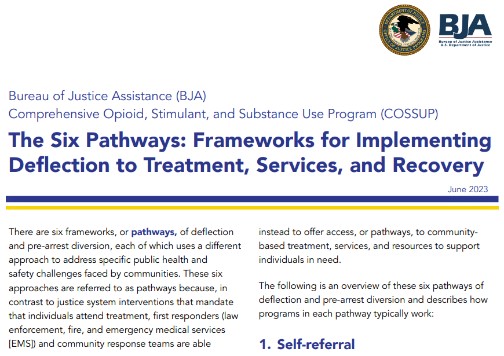 Center for Health and Justice at Treatment Alternatives for Safe Communities, June 2023
Center for Health and Justice at Treatment Alternatives for Safe Communities, June 2023
The Six Pathways: Frameworks for Implementing Deflection to Treatment, Services, and Recovery
There are six pathways of deflection and pre-arrest diversion, each of which uses a different approach to address specific public health and safety challenges. This overview describes how each of the six pathways typically works.
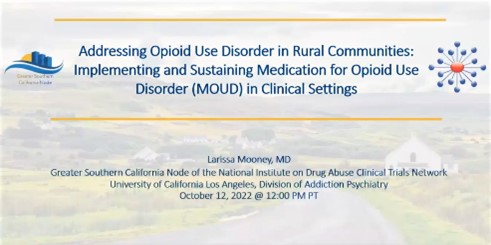 National Institute on Drug Abuse, October 2022
National Institute on Drug Abuse, October 2022
Addressing Opioid Use Disorder in Rural Communities, Session 1: Hindrances and Helps in Delivering Medications for Opioid Use Disorder (MOUD) Care in Rural Areas
The substance use disorder treatment and care options in rural communities differ from those in urban areas. This webinar explores some of the unique characteristics of rural communities and discusses the strengths and challenges of delivering medications for opioid use disorder care within rural areas.
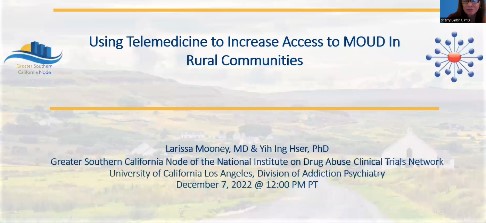 National Institute on Drug Abuse, December 2022
National Institute on Drug Abuse, December 2022
Addressing Opioid Use Disorder in Rural Communities, Session 2: Using Telemedicine to Increase Access to Medication for Opioid Use Disorder (MOUD) in Rural Communities
Telemedicine can play an important role in expanding access to medications for opioid use disorder (MOUD) in rural communities. This webinar highlights how telemedicine has been used to initiate and maintain access to MOUD in rural communities and shares presenters’ experiences using telemedicine approaches.
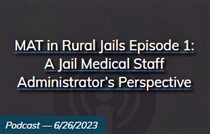 Advocates for Human Potential, Inc., June 2023
Advocates for Human Potential, Inc., June 2023
MAT in Rural Jails Episode 1: A Jail Medical Staff Administrator’s Perspective
This COSSUP podcast series offers listeners an opportunity to learn from individuals who are involved in providing medication-assisted treatment (MAT) and recovery support within rural jails. In this episode, Jill Harrington of the Albany County Correctional and Rehabilitative Services Center (ACCRSC) in New York discusses what makes ACCRSC’s medications for opioid use disorder program successful, the role of partnerships, and the importance of credentialed counselors.
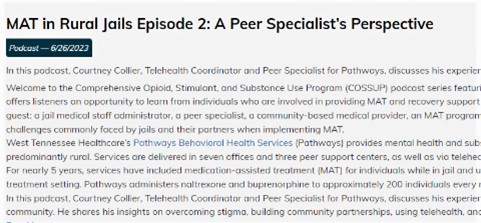 Advocates for Human Potential, Inc., June 2023
Advocates for Human Potential, Inc., June 2023
MAT in Rural Jails Episode 2: A Peer Specialist’s Perspective
This COSSUP podcast series offers listeners an opportunity to learn from individuals who are involved in providing medication-assisted treatment (MAT) and recovery support within rural jails. In this episode, Courtney Collier of West Tennessee Healthcare’s Pathways Behavioral Health Services discusses his experience working with individuals receiving MAT while in jail custody or upon transition to the community.
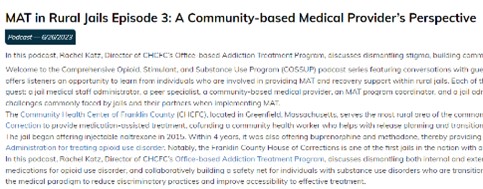 Advocates for Human Potential, Inc., June 2023
Advocates for Human Potential, Inc., June 2023
MAT in Rural Jails Episode 3: A Community-Based Medical Provider’s Perspective
This COSSUP podcast series offers listeners an opportunity to learn from individuals who are involved in providing medication-assisted treatment and recovery support within rural jails. In this episode, Rachel Katz of the Community Health Center of Franklin County’s Office-based Addiction Treatment Program in Greenfield, Massachusetts, discusses dismantling stigma through education, building community buy-in for medications for opioid use disorder, and building a safety net for individuals transitioning from incarceration to the community.
 Advocates for Human Potential, Inc., June 2023
Advocates for Human Potential, Inc., June 2023
MAT in Rural Jails Episode 4: A Medication-Assisted Treatment Program Coordinator’s Perspective
This COSSUP podcast series offers listeners an opportunity to learn from individuals who are involved in providing medication-assisted treatment and recovery support within rural jails. In this episode, Michael White, formerly of Community Medical Services, discusses the collective impact model for building collaboration, how to scale up provision of medication-assisted treatment, and what to expect from community providers.
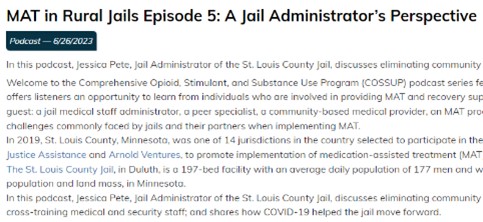 Advocates for Human Potential, Inc., June 2023
Advocates for Human Potential, Inc., June 2023
MAT in Rural Jails Episode 5: A Jail Administrator’s Perspective
This COSSUP podcast series offers listeners an opportunity to learn from individuals who are involved in providing medication-assisted treatment and recovery support within rural jails. In this episode, Jessica Pete of the St. Louis County Jail in Minnesota discusses eliminating community and staff bias against MAT and gives advice on program implementation, including cross-training medical and security staff members.
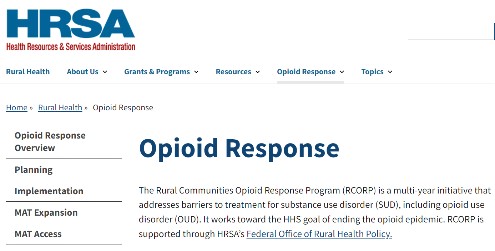 Health Resources and Services Administration, September 2022
Health Resources and Services Administration, September 2022
Rural Communities Opioid Response Program
The multi-year Rural Communities Opioid Response Program (RCORP) aims to reduce the morbidity and mortality of substance use disorder, including opioid use disorder, in high-risk rural communities. It includes funding for planning, implementation, medication-assisted treatment, neonatal abstinence syndrome, rural centers of excellence that advance the broader implementation of best practices, technical assistance to support RCORP grantees, and an evaluation of the RCORP program.
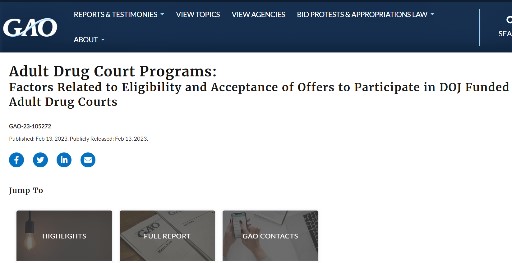 U.S. Government Accountability Office, February 2023
U.S. Government Accountability Office, February 2023
Adult Drug Court Programs: Factors Related to Eligibility and Acceptance of Offers to Participate in DOJ-Funded Adult Drug Courts
Adult drug courts are specialized courts for criminal offenders with substance use disorders that work to divert individuals from the criminal justice system by offering drug treatment and rehabilitation services. This report looked at reasons why some individuals may not participate in these programs, finding that some may not be eligible because of violent criminal records or mental health needs; others lack access to stable housing or transportation.
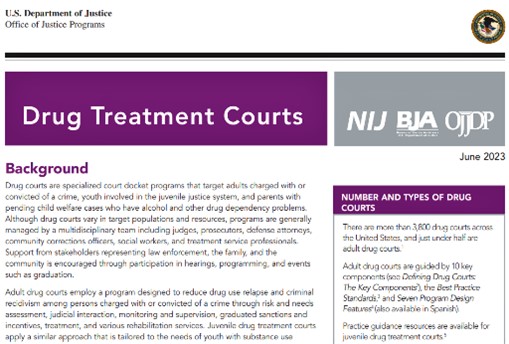 Bureau of Justice Assistance, National Institute of Justice, Office of Juvenile Justice and Delinquency Prevention, June 2023
Bureau of Justice Assistance, National Institute of Justice, Office of Juvenile Justice and Delinquency Prevention, June 2023
Drug Treatment Courts
Drug courts are specialized court docket programs that target adults charged with or convicted of a crime, youth involved in the juvenile justice system, and parents with pending child welfare cases who have alcohol and other drug dependency problems. This document details support provided to drug courts by the Bureau of Justice Assistance, National Institute of Justice, and Office of Juvenile Justice and Delinquency Prevention.
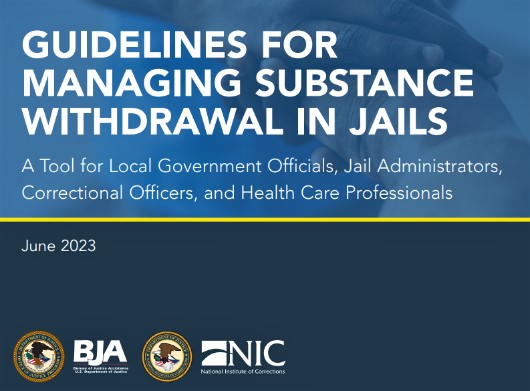 Bureau of Justice Assistance, National Institute of Corrections, June 2023
Bureau of Justice Assistance, National Institute of Corrections, June 2023
Guidelines for Managing Substance Withdrawal in Jails
Local government officials, jail administrators, correctional officers, and health-care professionals all play key roles in managing acute withdrawal from substances among individuals in jail custody. This groundbreaking resource will help jails develop policies and procedures for preventing or addressing substance withdrawal, thereby avoiding serious medical complications and facilitating treatment of SUDs.
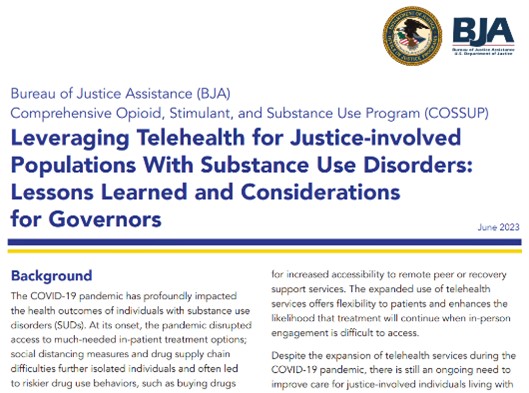 RTI International, June 2023
RTI International, June 2023
Leveraging Telehealth for Justice-involved Populations With Substance Use Disorders: Lessons Learned and Considerations for Governors
Despite the expansion of telehealth services during the COVID-19 pandemic, there is still an ongoing need to improve care for justice-involved individuals living with substance use disorders (SUDs). This brief reviews activities undertaken by states to expand the use of telehealth for such individuals, shares lessons learned, and highlights considerations for governors who wish to leverage telehealth services to increase access to SUD treatment.
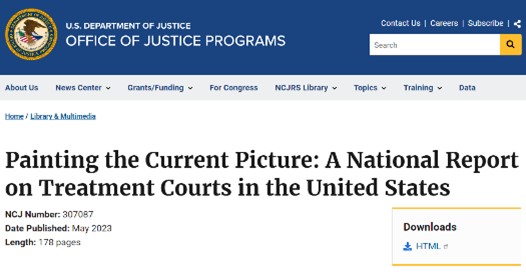 Bureau of Justice Assistance, May 2023
Bureau of Justice Assistance, May 2023
Painting the Current Picture: A National Report on Treatment Courts in the United States
The 2022 report Painting the Current Picture: A National Report on Treatment Courts in United States is a comprehensive look at the state of treatment courts in the United States. The National Drug Court Resource Center processed, analyzed, and condensed these data into one report, which shows a full picture of treatment court operations in the United States.
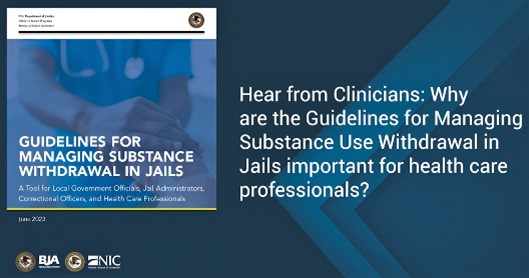 Bureau of Justice Assistance, National Institute of Corrections, June 2023
Bureau of Justice Assistance, National Institute of Corrections, June 2023
Perspectives on Substance Withdrawal Management: Clinicians
This video is a companion resource to the publication Guidelines for Managing Substance Withdrawal in Jails: A Tool for Local Government Officials, Jail Administrators, Correctional Officers, and Health Care Professionals. It features interviews with clinicians who describe the value and the many benefits of managing withdrawal in jails, including reduction in the likelihood of relapse.
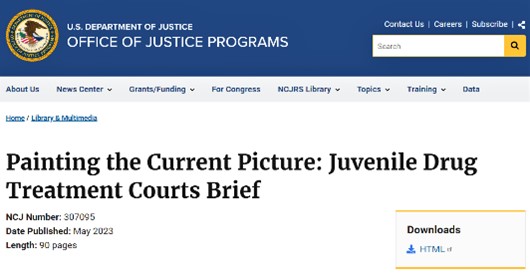 Bureau of Justice Assistance, May 2023
Bureau of Justice Assistance, May 2023
Painting the Current Picture: Juvenile Drug Treatment Courts Brief
Juvenile drug treatment courts (JDTCs) serve youth charged with a delinquency offense that is deemed to be influenced by substance use; youth participants are provided clinical treatment and case management. This brief outlines the primary objectives of JDTCs, summaries of each objective’s corresponding guideline statements, courts’ effectiveness, and an analysis of data provided by JDTCs.
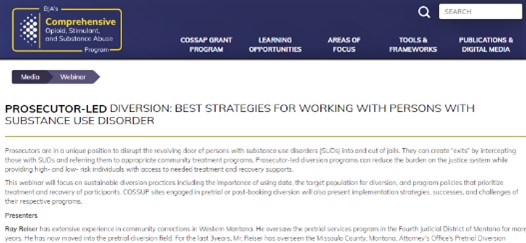 RTI International, May 2023
RTI International, May 2023
Prosecutor-Led Diversion: Best Strategies for Working With Persons With Substance Use Disorder
Prosecutors are in a unique position to disrupt the revolving door of persons with substance use disorders into and out of jails. Prosecutor-led diversion programs can reduce the burden on the justice system while providing access to needed treatment and recovery supports. This webinar focuses on sustainable diversion practices, the target population for diversion, and program policies that prioritize treatment and recovery.
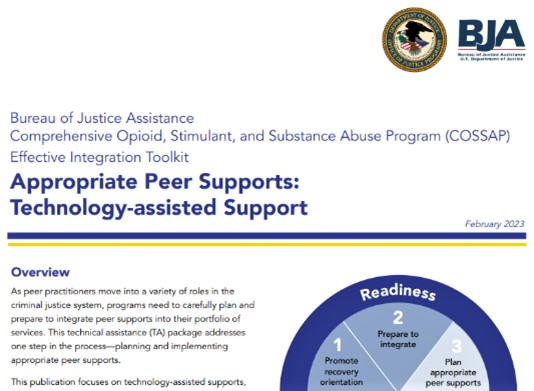 Altarum, February 2023
Altarum, February 2023
Appropriate Peer Supports: Technology-assisted Support
As peer practitioners move into a variety of roles in the criminal justice system, programs need to carefully plan and prepare to integrate peer supports into their portfolio of services. This technical assistance (TA) package addresses technology-assisted supports, examining the different types, the advantages and challenges of each, and their potential uses.
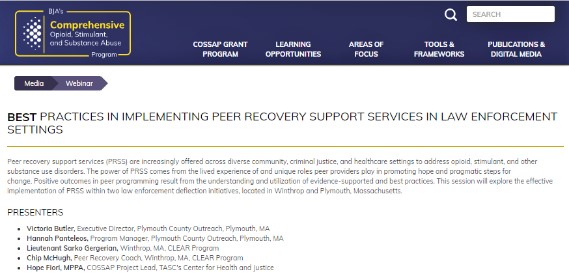 Center for Health and Justice at Treatment Alternatives for Safe Communities, January 2023
Center for Health and Justice at Treatment Alternatives for Safe Communities, January 2023
Best Practices in Implementing Peer Recovery Support Services in Law Enforcement Settings
Peer recovery support services (PRSS) are increasingly offered across diverse community, criminal justice, and health-care settings; the power of PRSS comes from the lived experience and unique roles peer providers play in promoting hope and change. This webinar explores the effective implementation of PRSS within two law enforcement deflection initiatives, located in Winthrop and Plymouth, Massachusetts.
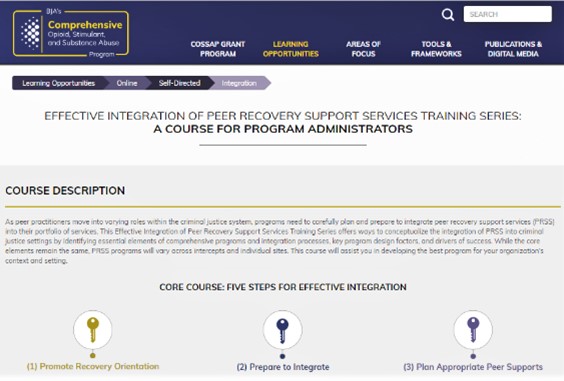 Bureau of Justice Assistance, May 2023
Bureau of Justice Assistance, May 2023
Effective Integration of Peer Recovery Support Services Training Series: A Course for Program Administrators
As peer practitioners move into varying roles within the criminal justice system, programs need to plan and prepare to integrate peer recovery support services (PRSS) into their portfolios of services. This training series offers ways to conceptualize the integration of PRSS into criminal justice settings by identifying essential elements of comprehensive programs, key program design factors, and drivers of success.
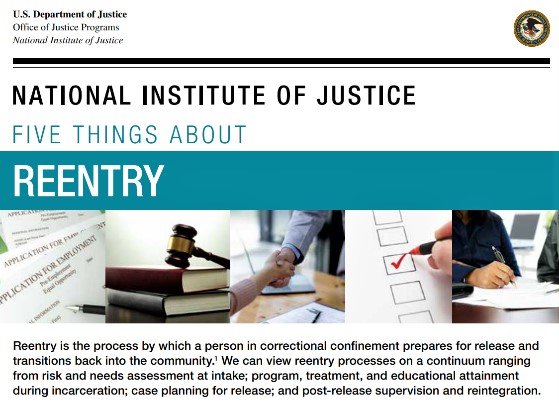 National Institute of Justice, April 2023
National Institute of Justice, April 2023
Five Things About Reentry
Reentry is the process by which a person in correctional confinement prepares for release and transitions back into the community; it is essential to understand how research can inform each stage of the reentry process, increasing the odds that people returning home can successfully remain in their communities. This brief describes five lessons about reentry based on decades of research evidence.
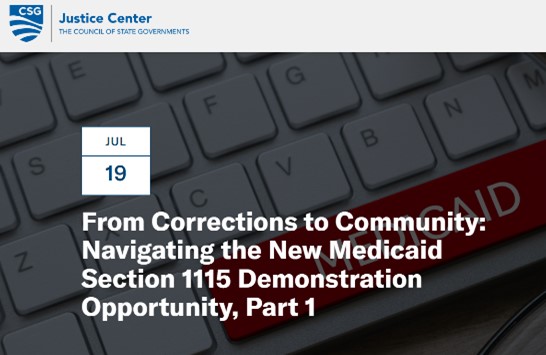 Bureau of Justice Assistance, Council of State Governments Justice Center, July 2013
Bureau of Justice Assistance, Council of State Governments Justice Center, July 2013
From Corrections to Community: Navigating the New Medicaid Section 1115 Demonstration Opportunity, Part 1
This webinar introduces correctional leaders and allied stakeholders to opportunities available under the new Medicaid Reentry Section 1115 to support transition-related strategies, pre-release services, and community reentry. Presenters provide an overview and discuss key considerations included in new guidance released in April 2023.
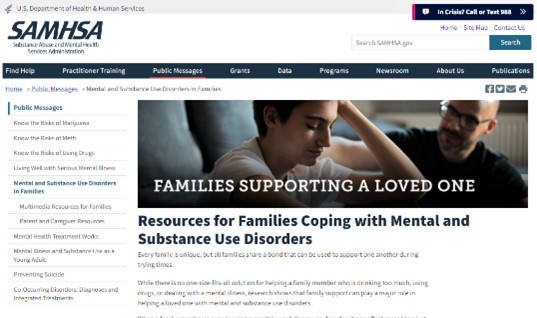 Substance Abuse and Mental Health Services Administration, March 2023
Substance Abuse and Mental Health Services Administration, March 2023
Resources for Families Coping With Mental and Substance Use Disorders
Research shows that family support can play a major role in helping a loved one with mental and substance use disorders; it is also important to remember that caregivers should take steps to prioritize their own health. This resource is designed to enable family members to connect those in need with treatment and services to begin and stay on their recovery journeys.
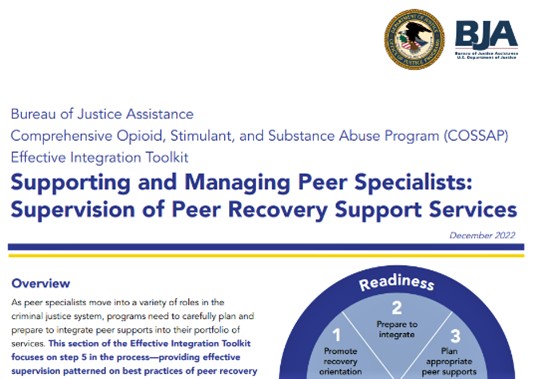 Altarum, December 2022
Altarum, December 2022
Effective Integration Toolkit—Supporting and Managing Peer Specialists: Supervision of Peer Recovery Support Services
Peer support is a unique discipline that recognizes that recovery from substance use disorders and co-occurring disorders involves more than symptom reduction or abstinence. This section of the Effective Integration Toolkit focuses on providing effective supervision patterned on best practices of peer recovery support services and working with criminal justice populations.
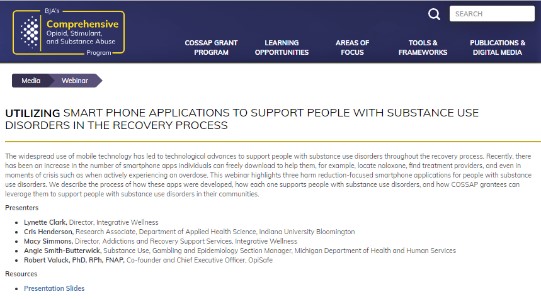 RTI International, March 2023
RTI International, March 2023
Utilizing Smart Phone Applications to Support People With Substance Use Disorders in the Recovery Process
The widespread use of mobile technology has led to technological advances to support people with substance use disorders (SUDs) throughout the recovery process. This webinar highlights three harm reduction-focused smart phone applications, describing how they were developed and how each supports people with SUD.




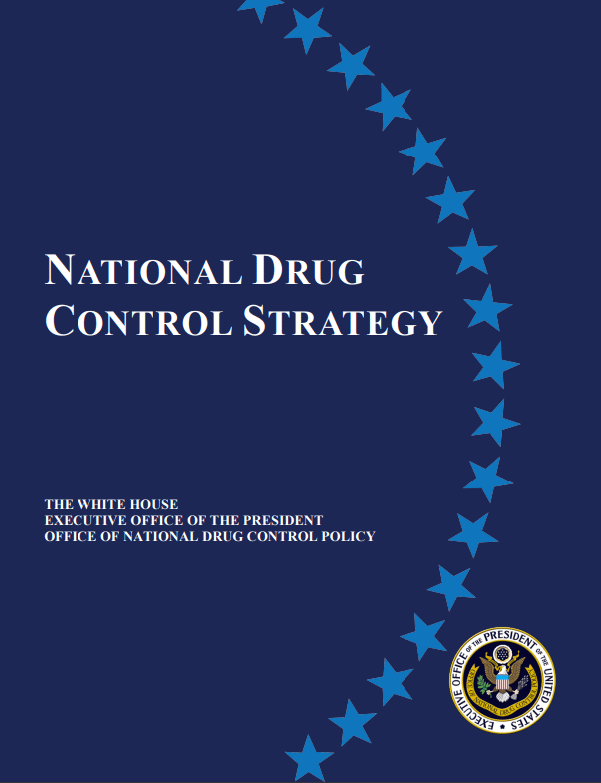

 White House Proclamation
White House Proclamation
 Video Message By BJA Director Karhlton Moore
Video Message By BJA Director Karhlton Moore
 Deflection Engagement Course for First Responders
Deflection Engagement Course for First Responders
 Webinar: Reducing Stigma in Deflection Work
Webinar: Reducing Stigma in Deflection Work
 Justice Today Podcast with Brad Carlyon
Justice Today Podcast with Brad Carlyon
